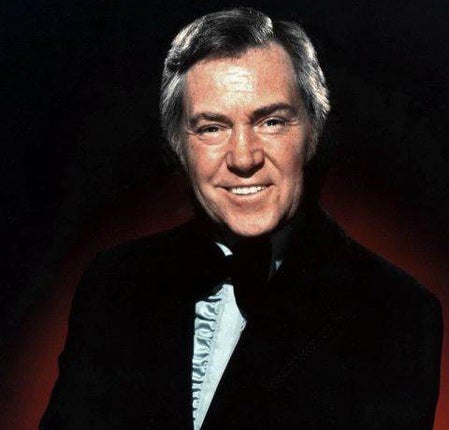Malcolm Vaughan: Singer who fell foul of the BBC but sold half a million records as a result

In October 1956, Malcolm Vaughan was due to appear on BBC TV's Off The Record to promote his new release, "St. Therese Of The Roses". The invitation was withdrawn a few days later after a BBC committee had determined that the record was unsuitable for broadcast because "the lyric is contrary both to Roman Catholic doctrine and to Protestant sentiment." The resulting controversy helped to sell records, and with airplay on Radio Luxembourg the sugary wedding song climbed to No 3, stayed on the charts for five months and sold half a million copies.
Malcolm Vaughan was born Malcolm James Thomas, the son of a miner, in Abercynon, Glamorgan in March 1929. The family were to move to Troedyrhiw, near Merthyr Tydfil, where his grandfather was a cobbler. The young boy was soon singing in the local choir, and, in 1943, his aunt wrote to the actor, Emlyn Williams, about joining his wartime repertory company. Thomas appeared in a touring version of The Druid's Rest which ended up in the West End. Richard Burton also made his stage début in this play. After this, Thomas had a singing role in another West End show, Jenny Jones.
Malcolm Thomas was still a boy soprano when he was 16 but his voice broke on stage while he was singing "Danny Boy" at the Glasgow Empire. Overcome with embarrassment, he returned home. He took jobs as they came along, appearing as an errand boy in the film Bedelia with Margaret Lockwood and being the voice of Dennis the Dachshund in a television production of Larry The Lamb. He was in the West End productions of two Thornton Wilder plays, Our Town and The Skin Of Our Teeth, which was directed by Laurence Olivier.
In 1947 Thomas did national service in Greece and Egypt. He then returned to show business, appearing in Aladdin and Dick Whittington on ice in Brighton. In 1952, he teamed up with three other vocalists to become the Welsh Street Singers and then supported Old Mother Riley in pantomime.
In 1953, Thomas appeared in the revue Going Gay in Eastbourne and befriended a comedian, Kenneth Earle. They thought of becoming a double act but didn't care for the sound of "Earle and Thomas". They walked around the high street, trying out different names, and settled on "Earle and Vaughan". Their humour was mundane by today's standards but they got by:
Earle: "Why was Bernard Shaw very like me?"
Vaughan: "I don't know. Why was Bernard Shaw very like you?"
Earle: "We're both clean-shaven, except for Bernard Shaw."
When the BBC disc jockey Jack Jackson saw Earle and Vaughan at the Chiswick Empire in 1955 he was impressed with Vaughan's impersonation of Mario Lanza. He arranged an audition with Wally Ridley, the head of HMV Records, who steered him away from light opera to the ballads of the day.
His first record, "Ev'ry Day Of My Life", became a Top 10 hit and he followed it with a successful version of Gilbert Bécaud's "Mes Mains", now called "With Your Love". Vaughan incorporated his records into Earle and Vaughan's act but he did not want to break up the partnership. They spent Christmas 1955 as Chinese policemen in Aladdin in Salford.
During 1955, Earle and Vaughan had judged a beauty contest at a holiday camp in Guernsey. Vaughan was attracted by the winner, Gaye Hands (Earle renamed her "Sad Feet"), and they were married in June 1956. They settled in Tooting and they were to have two children, Daryl Earle Haydn Samuel in 1957 and Damon Charles Michael in 1963. In 1963, Malcolm changed his name by deed poll to Malcolm Vaughan.
In 1957, Earle and Vaughan toured with the American rock'n'roll stars, Bill Haley and the Comets, and did surprisingly well in the circumstances. Later in the year, Vaughan appeared alongside other balladeers including David Whitfield and Ronnie Hilton in a special production number in the Royal Variety Performance. At the time he was enjoying another Top 10 single with "My Special Angel": in this case, Wally Ridley had amended the lyric of Bobby Helms' original to avoid a BBC ban.
Vaughan had further hits in the 1950s with "To Be Loved", "More Than Ever (Come Prima)" and "Wait For Me", and sang the theme song from the Kenneth More film about the sinking of the Titanic, A Night To Remember (1958). Strangely, Vaughan did not make an album until Hello in September 1959. Ridley, his producer, told the New Musical Express: "I felt it was better to let his voice mature before getting him to tackle the better quality songs needed for an album."
Earle and Vaughan continued to work as a double act throughout the 1960s but never realised their ambition of making comedy films like Morecambe and Wise. It would have been better for Vaughan's career if he had continued making records and capturing the same market as Matt Monro. The duo split up in 1972 with Earle becoming an agent and Vaughan touring in productions of The Good Old Days. A biography, The Reluctant Star, by Edward Thomas was published in 2009, the title reflecting the fact that Malcolm Vaughan put family life above everything.
Spencer Leigh
Malcolm James Thomas (Malcolm Vaughan), singer: born Abercynon 22 March 1929; married 1956 Gaye Hands (two sons); died Eastbourne 9 February 2010.
Subscribe to Independent Premium to bookmark this article
Want to bookmark your favourite articles and stories to read or reference later? Start your Independent Premium subscription today.

Join our commenting forum
Join thought-provoking conversations, follow other Independent readers and see their replies